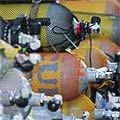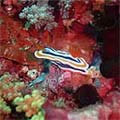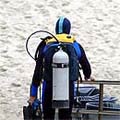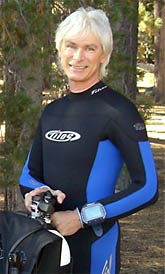« Missed Scuba Show 2007! | Main | Underwater cameras without cases »
June 13, 2007
My other passion
I often bemoan the fact that I cannot go diving whenever I feel like it. Well, actually I technically can as I have a nice pool in my backyard, but that doesn't really count. It does and it doesn't. Anyway, tonight I indulged in my other passion, racing cars. So if you have no interest in cars whatsoever, this entry will not be of much value to you. To me it is a hobby and passion like scuba, something that enriches my life, gets my adrenaline pumping, and just generally makes me feel good. There are also a number of parallels to diving, and so I want to explain what it's all about, and why it is similar.
When I say racing cars, I don't mean extreme racing or anything exceedingly expensive and dangerous. For me, it's mostly just going to the local drag strip, Sacramento Raceway, and participate in the Wednesday Night "Fun Drags." What's drag racing? It's very simple. There is straight track with two lanes and it is a quarter mile long (plus another eight of a mile or so to slow down). Two cars line up and wait for the lights on the "Christmas Tree" to count down. You slowly drive up until light sensors detect the front wheels of your car. First one yellow light comes on, then a second. That means you're "staged." Then, in half second increments, three more yellow lights come on and then a green one. On green (or really a bit before, as it takes the wheels a bit of time to move past the sensors) you take off and race down the track. Whoever crosses the finish line first wins.
What's so exciting about that? Well, speed and acceleration must be primal urges or else there wouldn't be ever faster cars. Is there any rational explanation why vehicles you can buy in any showroom can go almost 200 miles per hour when the speed limit is 65 or 70? Speed thrills, apparently, and speed and power have become status symbols. But it kills, too, and that is why there are race tracks. I never race on the street. But I love to go to the track.
How did this get started? I really don't know. I've always loved cars, and I used to go to the local drag strip when I lived in upstate New York. Lebanon Valley Dragway was nestled in the woods of rural upstate, a good distance away from any civilization, and it was fun. I really didn't think I'd ever race myself, and I wouldn't, not for another 20 years.
In 2003 things didn't look so good in my life and rather than moping I made a somewhat frivolous decision. I cashed in a CD and bought a brand-new 2004 Acura RSX sports coupe, cash. I had never actually driven one other than in a Microsoft XBox video game called "Project Gotham II," but I've had Hondas before. The sales manager loved the story. A customer buying a car without even driving it, just based on a video game!
It was a nice car, all black metallic with a blueish sheen to it. I always research things, of course, and within days I became a member of ClubRSX.com, a website devoted to the car. Little did I know that this would start me on a trek where I'd become an almost instant expert, write thousands of posts, extensively modify my car, and write "FAQs" (a web notation for "Frequently Asked Questions") on electronic engine tuning and then on superchargers. Yes, within months I became obsessed with learning as much as I could about that car and how it could be modified. I got into ECU tuning, which is the science of altering the programming of a car's computer to make it adapt to modifications and to make more power. I attended a seminar by a company called Hondata that specialized in automotive computer programming, had hands-on tuning sessions, attended a performance tuning class, and spent a lot of time and money systematically modifying my car. First it was just replacing the air intake with a more efficient one, then came the exhaust header and the exhaust, the suspension, the computer, and so on and so on. I documented everything, engaged in discussion, wrote how-to's for everything I did, and soon became a source of information for others.
Eventually I got into more serious stuff. You can gain a lot of power by adding a turbo or a supercharger to a motor, and I became fascinated with superchargers. Now we're getting into something divers can relate to: compress the air and you have more oxygen molecules. More oxygen molecules mean you can burn more fuel in your engine and thus make more power. And just like there is an optimal gas mix for every depth and just as there are limits as to what you can do before things get dangerous, it's the same with internal combustion engines. They like a certain ratio between air and fuel. If it's too lean there isn't enough cooling and the engine gets hot and can blow. If it's too rich, well, then it cools okay but won't run right. It's a science.
In car tuning, there are different cliques. Some go for cool looks. Others for handling. I was drawn to speed and power. In those circles, what an engine can do on the dyno matters. How much extra power did those modifications yield? A dynamometer, or "dyno," is a machine that measures how much power a car's engine makes. That's for bragging rights. The other thing that matters is speed. Not "kills" (accounts of street races won), but actual results on the race track. You get a time slip there, and it does not lie.
It took me a while to muster up the courage to actually go race. Just like scuba, it seemed all so complicated, with all those people milling about, knowing exactly what to do, whereas to me it looked incomprehensible. So one afternoon I went, asked a lot of silly questions, and then it was time to race. Adrenaline made my heart pound as I rolled onto the track for the first time, not unlike I felt when I took my first breath underwater. Just like in the pool, I knew it was going to happen, I was going to do it, it was inevitable. I did lousy on my first run, but it was so much fun. I did much better on my second, and before the night was over, I had taken on and beaten a bewinged Nissan 300ZX that did vicious burnouts. That victory was immortalized on video by a friend. It is now on YouTube. Oh, I forgot to mention: I did not take my supercharged Acura racing that first time. I took my lowly Chrysler PT Cruiser. It has a turbo motor and is modified, too, so it is not slow.
So that started a new era in my life. I went to the track almost every Wednesday and actually won four trophies in my first season, two outright wins and two runner-ups. It was the thrill of victory and the agony of defeat, and it wasn't even very dangerous. Even a highly modified supercharged car like my Acura RSX only reached a speed of 105 to 110 miles per hour or so at the end of the quarter mile.
I became a member of the NHRA, the National Hot Rod Association, the primary sanctioning body of drag racing. Would this lead to the kind of escalation I see in scuba, where open water certification leads to advanced diving, specialties, and ever more daring and dangerous exploits? It very well can. There is almost no limit to drag racing. The fasted dragsters are fire-breathing, earth-pounding monsters with thousands of horsepowers. They run the 1/4-mile in little more than four seconds, during which they achieve speeds of over 330 miles per hour. Unthinkable you may say. But perhaps no more than Sheck Exley and Dave Shaw penetrating caves and descending to deepest depths, and technical divers ever pushing the limits of what is humanly possible.
Did it lead me there? To extremes? It didn't. I participated in a few "points races" and decided it was not for me. I loved working on my car, adding modifications, discussing them, but I felt no desire to go farther. It was a hobby that gave me pleasure and I spent a lot of time and money on it, but I felt no need to go to extremes. Will it be the same with scuba? The two are really similar in many respects. I guess I will find out.
Posted by conradb212 at June 13, 2007 11:14 PM








